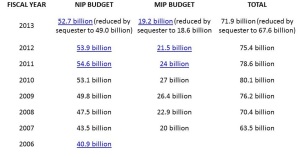
Intelligence Budget Data
On March 4, 2014, the Administration submitted its Fiscal Year 2015 budget request, including a base funding request of $45.6 billion for the National Intelligence Program (NIP), and a base funding request of $13.3 billion for the Military Intelligence Program (MIP). On June 30, the DNI submitted an updated FY2015 budget request of $49.4 billion for the NIP including funding for overseas contingency operations. An updated budget request figure for the MIP has not yet been disclosed.
Phi Beta Iota: We consider these figures to be severely deceptive and roughly 70% of the actual combined total budget for green and black intelligence capabilities that are secret, toxic, and a mix of benignly worthless (standing armies of ignorant analysts, collection that is not processed) and pathologically dangerous (drones, renditions, covert operations, subsidies to foreign intelligence services). Our best guess of the actual total US secret intelligence budget remains US$100 billion per year, inclusive of thousands of private sector “intelligence” capabilities (many of them “open source” and extremely mediocre) that are embedded within acquisition and other contracts, all out of control and of dubious value.

Click to access Office of the Director of National Intelligence Budget Justifications








